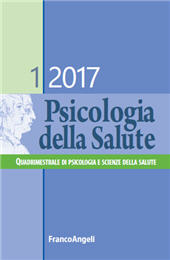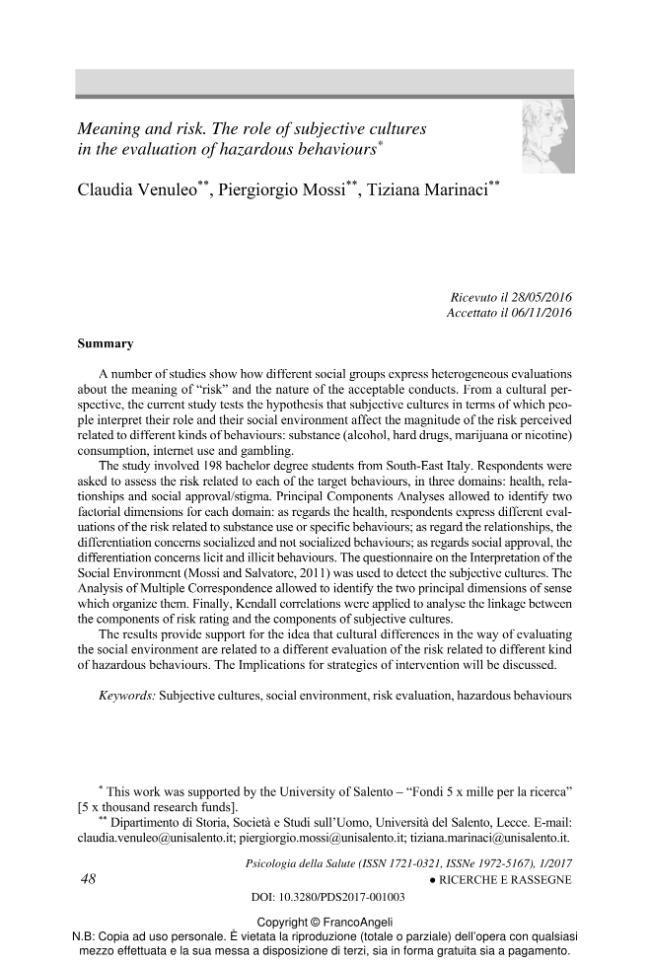Meaning and risk : the role of subjective cultures in the evaluation of hazardous behaviours
48-75 p.
A number of studies show how different social groups express heterogeneous evaluations about the meaning of "risk" and the nature of the acceptable conducts. From a cultural perspective, the current study tests the hypothesis that subjective cultures in terms of which people interpret their role and their social environment affect the magnitude of the risk perceived related to different kinds of behaviours: substance (alcohol, hard drugs, marijuana or nicotine) consumption, internet use and gambling. The study involved 198 bachelor degree students from South-East Italy.
Respondents were asked to assess the risk related to each of the target behaviours, in three domains: health, relationships and social approval/stigma. Principal Components Analyses allowed to identify two factorial dimensions for each domain: as regards the health, respondents express different evaluations of the risk related to substance use or specific behaviours; as regard the relationships, the differentiation concerns socialized and not socialized behaviours; as regards social approval, the differentiation concerns licit and illicit behaviours.
The questionnaire on the Interpretation of the Social Environment (Mossi and Salvatore, 2011) was used to detect the subjective cultures. The Analysis of Multiple Correspondence allowed to identify the two principal dimensions of sense which organize them. Finally, Kendall correlations were applied to analyse the linkage between the components of risk rating and the components of subjective cultures. The results provide support for the idea that cultural differences in the way of evaluating the social environment are related to a different evaluation of the risk related to different kind of hazardous behaviours. The Implications for strategies of intervention will be discussed.[Publisher's Text].
Diversi studi evidenziano come gruppi sociali differenti esprimano valutazioni eterogenee su cosa sia rischio e su quale sia la natura dei comportamenti accettabili. Inscrivendosi entro una prospettiva culturale, il presente studio verifica l'ipotesi che le culture soggettive con cui le persone interpretano il proprio ruolo e il proprio ambiente sociale impattano la grandezza del rischio percepito in relazione a differenti comportamenti: consumo di sostanze (alcol, droghe pesanti, marjuana o nicotina), uso di internet e gioco d'azzardo. Lo studio ha coinvolto 198 studenti universitari del sud-est di Italia. Ai rispondenti è stato chiesto di valutare il rischio connesso a ciascun comportamento target, in tre domini: salute, relazioni e approvazione/stigma sociale.
L'Analisi in Componenti Principali ha consentito di identificare due dimensioni fattoriali per ciascun dominio: sul piano della salute, i rispondenti esprimono differenti valutazioni del rischio associato al consumo di sostanze o a determinati comportamenti; sul piano delle relazioni, le differenziazioni concernono i comportamenti socializzati e non socializzati; sul piano dell'approvazione sociale, i comportamenti leciti o illeciti. Il questionario sull'Interpretazione dell'Ambiente Sociale (Mossi e Salvatore, 2011) è stato somministrato per rilevare le culture soggettive.
L'Analisi delle Corrispondenze Multiple ha consentito di identificare le due principali dimensioni di senso che le caratterizzano. Infine, correlazioni di Kendall sono state usate per analizzare il rapporto tra le componenti di valutazione del rischio e le componenti delle culture soggettive. I risultati sostengono l'idea che differenze culturali nel modo di valutare l'ambiente sociale corrispondono a differenti valutazioni del rischio associato a differenti tipologie di comportamento. Saranno discusse le implicazioni per le strategie di intervento. [Testo dell'editore].
-
Articoli dello stesso fascicolo (disponibili singolarmente)
-
Informazioni
Codice DOI: 10.3280/PDS2017-001003
ISSN: 1972-5167
MATERIE
PAROLE CHIAVE
- Culture soggettive, ambiente sociale, valutazione del rischio, comportamenti a rischio
- Subjective cultures, social environment, risk evaluation, hazardous behaviours



